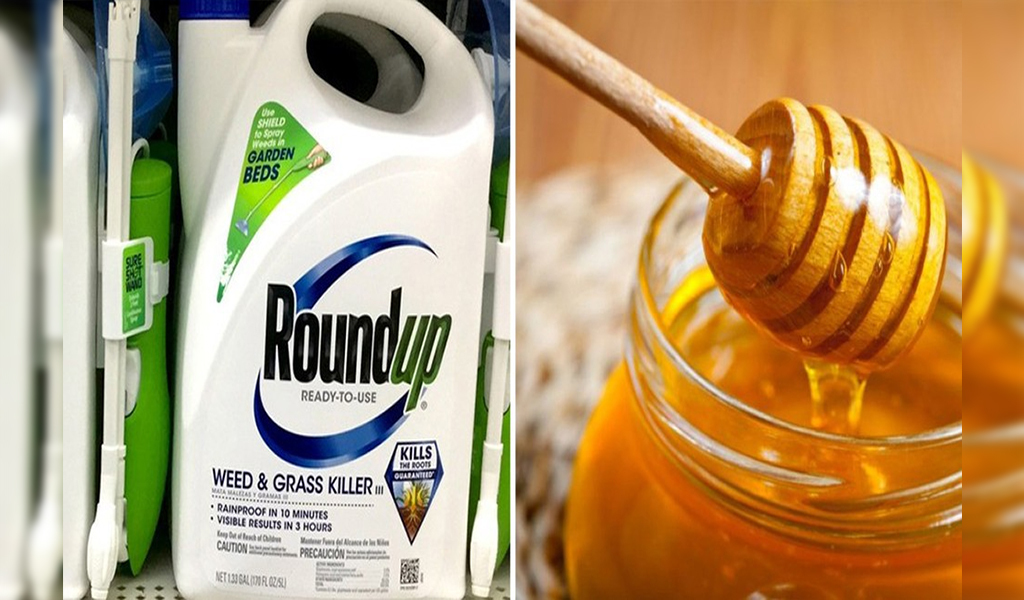The Truth About U.S. Honey Isn’t So Sweet
What do you do when you find out that the “branded, organic honey” you religiously put in your coffee every morning is tainted with glyphosate? Do you accuse the manufacturer of selling “fake organic honey” or do you figure out how the glyphosate got to the bees’ organically manufactured honey?
The group U.S. Right to Know has revealed that by invoking the Freedom of Information Act, they have secured confidential documents stating the U.S. Food and Drug Administration (FDA) has known and confirmed the presence of glyphosate in honey being sold at U.S. stores.
Glyphosate is the active ingredient in the world’s most popular herbicide Roundup. Roundup is manufactured by Monsanto which has practically led the creation of genetically modified organisms (GMOs) that are highly resistant to pests. In 2015, the World Health Organization’s International Agency for Research on Cancer (IARC) declared glyphosate a “probable human carcinogen”.
Based on the documents secured by the U.S. Right to Know, every honey sample tested by the FDA tested positive for glyphosate, sometimes even exceeding twice the levels allowed in the European Union (EU).
The FDA and Glyphosate Residues in Honey
Even though the FDA consistently conducted annual tests for pesticide residues in many food products, and the U.S. Department of Agriculture (USDA) annually tests produce, both government agencies have historically declined to test for glyphosate residue, claiming that the chemical is so safe there is no need to test.
With the pressure exerted by the IARC after the 2015 ruling about glyphosate, the U.S. FDA was subjected to intense pressure to conduct their own independent study on glyphosate residues. However, the lack of an official study by the FDA did not deter independent researchers from conducting tests on their own. A number of the researchers found glyphosate residues in various grain-based foods including non-GMO products such as oats.
Critics are concluding that small amounts of glyphosate residues can add up to nerve-wracking doses later on. So last year, the FDA made a test of the commercial honey available in U.S. supermarkets including other foods as well. Of the known honey brands tested, the ones included in the study were Florida-based Leighton’s Orange Blossom Honey, Louisiana-based Carmichael’s Honey, and the Iowa-based Sue Bee Honey Cooperative.
The researchers found glyphosate residues of 22 parts per billion (ppb) in Leighton’s, 41 ppb in Sue Bee, and 107 ppb in Carmichael’s. These results are consistent with earlier findings in a previous study wherein the scientists found average residue levels of 64 ppb in 41 out of 69 honey samples.
It is difficult to find honey that does not contain glyphosate residues, said one researcher. Even FDA scientist Narong Chamkasem revealed that some of the samples were 10 times the EU tolerance level of 50 ppb. Technically, the U.S.’s Environmental Protection Agency (EPA) has not established an acceptable tolerance level for herbicides in honey. In an official statement, the EPA said it is evaluating the possibility of establishing tolerance levels for residues of pesticides in honey (it has established tolerance levels for pesticides in fruits and vegetables sold commercially).
The EPA also said there was no reason for consumers to be alarmed about the residue in honey. “EPA has examined the glyphosate residue levels found in honey and has determined that glyphosate residues at those levels do not raise a concern for consumers,” the agency statement said.
So Where Did the Residues Come From?
Take a good guess where the glyphosate residues came from? Obviously, it came from the bees that gathered honey from plants and flowers that were sprayed with Roundup and other herbicides. You can’t teach bees to avoid plants with herbicide.
This might also be partly the reason why bees are dying in droves all over the world – because they are subjected to glyphosate residues from Roundup and other similar herbicides.
On humans, Roundup has been tested to cause the following ailments:
- Anemia
- Fever
- Fatigue
- Enlarged lymph nodes
- Swelling of the abdomen
- Shortness of breath
- Weight loss or loss of appetite
- Chest pains
Not to mention Roundup is a potential cause for cancer, as previous scientific studies have established.
Where do we go from here?
Is the situation in the U.S. similar to the Philippines? Not quite sure about the bee population but I do know Roundup has been used all throughout the country by farmers who do not know its true nature and the harm it brings to crops and consumers. It is also bad news for us since we need our bees to pollinate our crops.
But – I do know that when you talk to farmers in the countryside, you will hear them lament about the lack of bees to pollinate crops in certain parts of the country. And that is not good. Bees, apparently, die from too many herbicides applied on the plants they pollinate – and that’s a fact.
What about you, do you have any opinion about the widespread presence of glyphosate in honey? Let us know your opinions in the comments below.
Copyright 2022, DoctorFarrah.com


